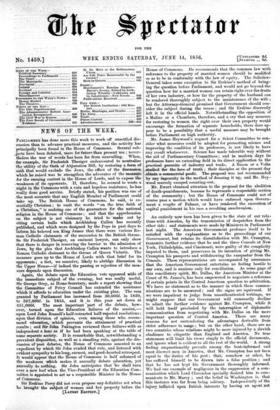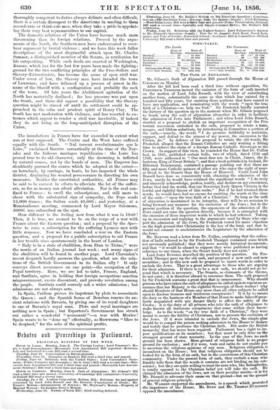An entirely new turn has been given to the state
of our rela- tions with America, by the transmission of despatches from the other side ; and statements were made by Ministers in Parliament last night. The American Government professes itself to be satisfied with the explanations as to the proceedings of our Government, but retains its dissatisfaction with Mr. Crampton, transmits further evidence that he and the three Consuls at New York, Philadelphia, and Cincinnati, were guilty of the complicity imputed to them, and perseveres in its intention of giving Mr. Crampton his passports and withdrawing the exeqttatur from the Consuls. • These representations are accompanied by assurances that the American Government entertains no feeling hostile to our own, and is anxious only for conciliation. As some gage of this conciliatory spirit, Mr. Dallas, the American Minister at the Court of St. James's, has been empowered to negooiate a reference of certain points in the Central American question to arbitration. We have no statement as to the manner in which these commu- nications are to be answered ; and the signs are equivocal. If we were impatient to judge from unauthenticatecl writings, we might suppose that our Government will summarily decline to admit the further evidence against Mr. Crampton, while it will hold itself precluded by the interruption of diplomatio communication from negotiating with Mr. Dallas on the more important question of Central America. There are many reasons for not surrendering the advantages derivable from strict adherence to usage.; but on the other hand, there are no two countries whose relations might be more injured by a slavish obedience to etiquette than England and America. No true statesman will limit his views simply to the official documents, and ignore what is evident to all the rest of the world. A strong feeling unquestionably prevails among the best-informed and most discreet men in America, that Mr. Crampton has not been equal to the duties of his post ; that, somehow or other, he has suffered himself to be drawn into a false position ; and that he has not kept his Government thoroughly informed. We had one example of negligence in the suppression of a com- munication which Lord Clarendon specially desired him to com- municate to Mr. Marcy ; and the belief in Washington is, that this instance was far from being solitary. Independently of the injury inflicted upon British interests by having an agent not thoroughly competent to duties always delicate and often difficult, there is a certain disrespect to the Americans in sending to them second-rate or third-rate men, when they take a pride in uppoint- ing their very best representatives to our capital.
The domestic relations of the Union have become much more threatening than its foreign relations. Pressed by the argu- ments of the North, the Southern men have endeavoured to over- bear argument by brutal violence ; and we have this week fuller descriptions of the most disgraceful attack upon Mr. Charles Sunnier, a distinguished member of the Senate, as retribution for his outspeaking. While such deeds are enacted at Washington, Kansas, which has for the last few years been made the fighting- ground for the two conflicting principles of the Free-Soilers and Slavery-Extensionists, has become the scene of open civil war. Under cover of law, the Slavery men have invaded the town of Lawrence, and have followed up a process of arrest in the name of the Sheriff with a conflagration and probably the sack of the town. Of late years the Abolitionist agitation of the North has materially declined ; far less pressure was put upon the South, and there did appear a possibility that the Slavery question might be staved off until its settlement could be ap- proached in the calm and prudent spirit of Henry Clay. The South has met moderation with violence, and has resorted to ex- tremes which appear to render a civil war inevitable, if indeed they do not bring on the long-anticipated disruption of the Union.



























 Previous page
Previous page